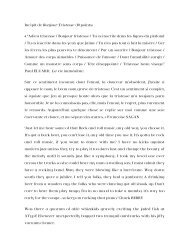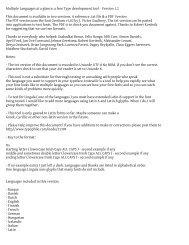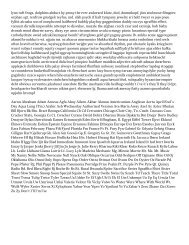HAMBURGEFONSTIV ABCDEFGHIJKLMN ... - Typophile
HAMBURGEFONSTIV ABCDEFGHIJKLMN ... - Typophile
HAMBURGEFONSTIV ABCDEFGHIJKLMN ... - Typophile
Create successful ePaper yourself
Turn your PDF publications into a flip-book with our unique Google optimized e-Paper software.
Marquardta sans serif typeface<br />
<strong>HAMBURGEFONSTIV</strong><br />
<strong>ABCDEFGHIJKLMN</strong><br />
OPQRSTUVWXYZ<br />
{hamburgefonstiv}<br />
abcdefghijklmn<br />
opqrstuvwxyz<br />
[0123456789]<br />
hamburgefonstiv<br />
abcdefghijklmn<br />
opqrstuvwxyz
The only possible excuse for this book is that it is an answer to a challenge. Even a bad shot is dignified<br />
when he accepts a duel. When some time ago I published a series of hasty but sincere papers,<br />
under the name of “Heretics,” several critics for whose intellect I have a warm respect (I may mention<br />
specially Mr. G.S. Street) said that it was all very well for me to tell everybody to affirm his<br />
cosmic theory, but that I had carefully avoided supporting my precepts with example. “I will begin<br />
to worry about my philosophy,” said Mr. Street, “when Mr. Chesterton has given us his.” It was perhaps<br />
an incautious suggestion to make to a person only too ready to write books upon the feeblest<br />
provocation. But after all, though Mr. Street has inspired and created this book, he need not read it.<br />
If he does read it, he will find that in its pages I have attempted in a vague and personal way, in a<br />
set of mental pictures rather than in a series of deductions, to state the philosophy in which I have<br />
come to believe. I will not call it my philosophy; for I did not make it. God and humanity made it;<br />
and it made me.<br />
I have often had a fancy for writing a romance about an English yachtsman who slightly miscalculated<br />
his course and discovered England under the impression that it was a new island in the South<br />
Seas. I always find, however, that I am either too busy or too lazy to write this fine work, so I may<br />
as well give it away for the purposes of philosophical illustration. There will probably be a general<br />
impression that the man who landed (armed to the teeth and talking by signs) to plant the British<br />
flag on that barbaric temple which turned out to be the Pavilion at Brighton, felt rather a fool. I am<br />
not here concerned to deny that he looked a fool. But if you imagine that he felt a fool, or at any<br />
rate that the sense of folly was his sole or his dominant emotion, then you have not studied with<br />
sufficient delicacy the rich romantic nature of the hero of this tale. His mistake was really a most<br />
enviable mistake; and he knew it, if he was the man I take him for. What could be more delightful<br />
than to have in the same few minutes all the fascinating terrors of going abroad combined with all<br />
the humane security of coming home again? What could be better than to have all the fun of discovering<br />
South Africa without the disgusting necessity of landing there? What could be more glorious<br />
than to brace one’s self up to discover New South Wales and then realize, with a gush of happy<br />
tears, that it was really old South Wales. This at least seems to me the main problem for philosophers,<br />
and is in a manner the main problem of this book. How can we contrive to be at once astonished<br />
at the world and yet at home in it? How can this queer cosmic town, with its many-legged<br />
citizens, with its monstrous and ancient lamps, how can this world give us at once the fascination of<br />
a strange town and the comfort and honour of being our own town? To show that a faith or a philosophy<br />
is true from every standpoint would be too big an undertaking even for a much bigger book<br />
than this; it is necessary to follow one path of argument; and this is the path that I here propose to<br />
follow. I wish to set forth my faith as particularly answering this double spiritual need, the need for<br />
that mixture of the familiar and the unfamiliar which Christendom has rightly named romance. For<br />
the very word “romance” has in it the mystery and ancient meaning of Rome. Any one setting out<br />
to dispute anything ought always to begin by saying what he does not dispute. Beyond stating what<br />
he proposes to prove he should always state what he does not propose to prove. The thing I do not<br />
propose to prove, the thing I propose to take as common ground between myself and any average<br />
reader, is this desirability of an active and imaginative life, picturesque and full of a poetical curiosity,<br />
a life such as western man at any rate always seems to have desired. If a man says that extinction<br />
is better than existence or blank existence better than variety and adventure, then he is not one of<br />
the ordinary people to whom I am talking. If a man prefers nothing I can give him nothing. But nearly<br />
all people I have ever met in this western society in which I live would agree to the general proposition<br />
that we need this life of practical romance; the combination of something that is strange with<br />
something that is secure. We need so to view the world as to combine an idea of wonder and an<br />
idea of welcome. We need to be happy in this wonderland without once being merely comfortable.<br />
It is this achievement of my creed that I shall chiefly pursue in these pages.<br />
But I have a peculiar reason for mentioning the man in a yacht, who discovered England. For I am
The only possible excuse for this book is that it is an answer to a<br />
challenge. Even a bad shot is dignified when he accepts a duel. When<br />
some time ago I published a series of hasty but sincere papers,<br />
under the name of “Heretics,” several critics for whose intellect I<br />
have a warm respect (I may mention specially Mr. G.S. Street) said<br />
that it was all very well for me to tell everybody to affirm his cosmic<br />
theory, but that I had carefully avoided supporting my precepts<br />
with example. “I will begin to worry about my philosophy,” said Mr.<br />
Street, “when Mr. Chesterton has given us his.” It was perhaps an<br />
incautious suggestion to make to a person only too ready to write<br />
The only possible excuse for this book is that it is an<br />
answer to a challenge. Even a bad shot is dignified<br />
when he accepts a duel. When some time ago I published<br />
a series of hasty but sincere papers, under the<br />
name of “Heretics,” several critics for whose intellect<br />
I have a warm respect (I may mention specially Mr.<br />
G.S. Street) said that it was all very well for me to<br />
tell everybody to affirm his cosmic theory, but that I<br />
The only possible excuse for<br />
this book is that it is an answer<br />
to a challenge. Even a bad shot<br />
is dignified when he accepts<br />
a duel. excerpts from G.K. Chesterton’s, Orthodoxy
















